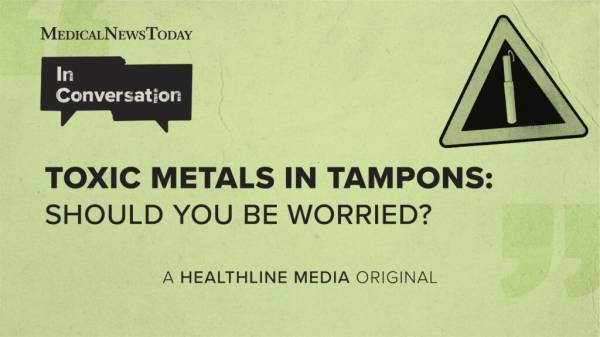Arsenic, cadmium, cobalt, chromium, lead, and zinc… These are just some of the metals a recent study found in tampons. However, not all of these metals are innocuous, and some are quite toxic to human health. In this podcast episode, we dissect what these findings mean and whether or not people should be worried about heavy metal contamination in menstrual products.

Share on PinterestResearchers have discovered traces of heavy metals in some brands of tampons. Healthline
The average person who menstruates uses over 11,000 pads throughout their lifetime. Some estimates suggest that this number may be closer to 15,000 for tampons and pads.
Considering that people use pads and tampons almost every month, and that the latter is inserted into a very sensitive area of the body that absorbs foreign substances really easily, it is natural to be concerned about being exposed to harmful chemicals.
Recently, a study found trace quantities of 16 heavy metals, including lead, arsenic, and cadmium, in 14 tampon brands available across the U.S. and the U.K. These findings have fueled anxiety about the safety of menstrual products — especially in the long-term.
But how do these heavy metals end up in tampons in the first place? Will regular exposure to such metals affect reproductive health over time? And are organic tampons safer, at least in terms of chemical exposure?
To explore these questions and more, Medical News Today editors and co-hosts Maria Cohut and Yasemin Nicola Sakay invited Anna Pollack, PhD, MPH, professor of Global and Community Health at George Mason University College of Public Health, on this latest In Conversation podcast episode.
Pollack, whose research revolves around the relationship between environmental chemical exposures and fertility, pregnancy, and gynecologic health, was also co-author of a large systematic review which looked at what kinds of chemicals end up in menstrual products like pads and tampons, and whether they can disrupt endocrine health.
To learn more, listen to our podcast episode in full below or on your preferred streaming platform.








